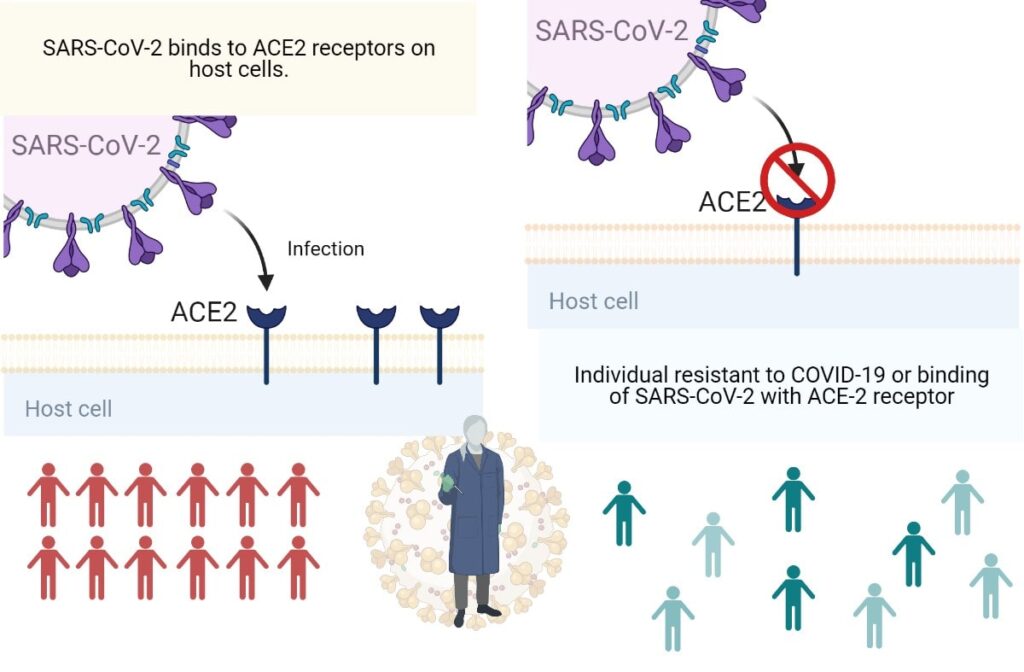The new coronavirus outbreak has been going on for over a year now. This pandemic has altered our lives in so many ways that it is difficult to comprehend. Scientists have been searching for different strategies to get rid of this virus, severe acute respiratory syndrome coronavirus 2 (SARS-CoV-2). Since then, scientists have been seeking individuals or groups who are naturally resistant to the SARS-CoV-2 virus.
According to Nature’s report, experts predict that by discovering and protecting individuals who are born resistant to the COVID-19 virus, they will be able to develop virus-blocking drugs that will eventually protect COVID-19 victims and stop the virus from spreading.
Mary Carrington, an immunogeneticist at the Frederick National Laboratory for Cancer Research in Bethesda, Maryland says, “It’s a terrific idea.” “Really, a wise thing to do.”
However, according to Isabelle Meyts, a pediatric immunologist and physician at the Catholic University of Leuven in Belgium, who is part of the consortium behind the effort, success is not guaranteed in this process because if the genetic resistance to COVID-19 exists, there may be few individuals who have it.
Sunil Ahuja, an infectious-diseases specialist at the University of Texas Health Science Centre at San Antonio says, “The question is how to find these people.” (“The search for people who never get COVID”) According to him, this process can be incredibly challenging.

The Search for Individuals Resistant to COVID-19
According to Evangelos Andreakos, an immunologist at the Biomedical Research Foundation of the Academy of Athens, they are quite sure about tracking down their target. They believe that identifying at least one individual could be particularly important to them.
The first and most vital task is to seek out people who have already been exposed to the patient, including through sharing beds and being in close proximity to the infected person. These are pairs known as discordant pairs, who have been exposed to the patient for a long time and have not tested positive. Ten research centers around the world have begun looking for applicants who meet these requirements.
They’ve enlisted the help of roughly 500 possible candidates. The goal for them is to attract 1,000 people, as said by Andreakos.” The response was a real surprise,” says Jean-Laurent Casanova, a geneticist and research co-author at Rockefeller University in New York City. “They never thought that individuals who are eligible to fit in these conditions would reach them themselves.”
The Issues at Hand
According to Sunil Ahuja, the researchers might be unable to complete this task since they must show that the candidates were highly exposed to the patient. They had to prove that the patient with COVID-19 was passing out massive amounts of live viruses when the two of them had been in immediate contact.
Although discordant pairs are not strange, it is still difficult to find candidates who meet that criterion and have been testing themselves on a regular basis.
However, many people have recently been fully vaccinated, which might try to cover any genetic resistance to the virus. This severely limits the scope of this study even more.
Following the detection of possible candidates, scientists will compare their genes to those of individuals who have previously been infected with the virus.
The suitable individual’s gene will be tested in animals and cell models to determine that there is a link between the individual’s gene and resistance, which might lead to the formation of a mode of action.
ALSO READ: More Responsive COVID-19 Waste Water Testing
The Mode of Action
The type of defense mechanism has been speculated on by the researchers working on the new project.
The most likely scenario is that SARS-COV-2 only uses the Angiotensin-converting enzyme 2 (ACE-2) receptor, whereas people who are resistant to the COVID-19 virus may not have a functioning one. This mechanism of action has already been observed in HIV. Scientists Ahuja and Carrington collaborated on a project in the 1990s to discover a rare mutation that impairs the CCR5 receptor on white blood cells, preventing HIV from entering them. “That knowledge has been really helpful,” says Carrington.
Other individuals who really are resistant to SARS-CoV-2 might just have amazingly strong immune responses, especially in the cells lining their noses. Andreakos says, “Some people might have mutations that ramp up genes that stop the virus from replicating and repackaging into new viral particles, or that break down viral RNA in the cell”. (“The search for people who never get COVID”) He goes on to say, “We are confident that we will find them.”
Reference: https://doi.org/10.1038/d41586-021-02978-6
